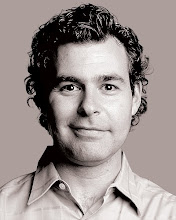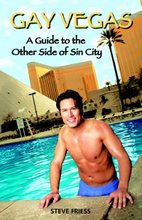Two pieces of his latest depressingly delusional defense point the way towards the problem with Sherm and editor Thomas Mitchell's entire stewardship of the Review-Journal. First, there's this:
There you have it, folks: The R-J is satisfied not just with being wrong but with being average. And that's with everything. Sherm's A-OK with getting by on the bare minimum of overworked reporters, with a functional but challenging website, with only a few stand-out writers, with middling, flat circulation. And now, Sherm is admitting, "middle of the pack" is something to brag about even as it has now shown that readers will be misinformed.
What's even sadder? If you look at the list he references, he doesn't even read it right. Their firm, Mason-Dixon, is at the BOTTOM of the pack. They're fifth of eight firms in accuracy, but two firms below M-D are tied in their inaccuracy, so really it's fifth out of seven scores. Also, M-D was off by an average of 4.6 points, and the No. 4 firm missed by 3.8 percent, a large gap that puts M-D in a red zone of inaccuracy because most polls offer a +/-4 margin of error. The results were outside the poll's margin. And in the case of the Titus-Heck race for Congress, Sherm's pollster had Heck winning by a blowout of 10 when he actually won by less than a point.
And then there's this gem from Sherm:
Except that they're NOT. They ceded that pole position long ago by aspiring to be nothing more than average. Their penetration of this market is less than the major papers in similar-sized cities and Web users flock in droves to the Sun's website long before they go to the R-J's for political news. Their longstanding practice of refusing to link out to other sites -- finally reversed -- and, of course, the horrid publicity from the Righthaven efforts to enforce copyrights have dramatically reduced the interest of others to link to them. In numerous ways, the R-J has removed itself from the legitimate conversation.
People baffle as to how I don't see the alleged right-wing bias in the news pages. But I don't because I know how newsrooms work and what really leads to lackluster journalism. In the R-J's case, the problem is far, far more that they still believe they are living in a different, much lazier and entitled media era, one that flows from a belief that there's such a thing as a "big boy." The R-J peeps think they can keep a Web audience without constantly updating information because they pine for the days when they could make everyone wait until sunrise for whatever they had to say. Their reporters don't blog in any consistent way that would develop a following, they think that if they ignore a hot story the Sun or Ralston or I have that it won't be a part of the news cycle, and they think that acknowledging competition is a weakness rather than a show of confidence.
All of this leaves the Review-Journal as the ankle-biter and, fittingly, completely unaware of same. They're not the big boys in any respect. Numbers alone, if they even had that to back such a claim up, don't make it thus. How many times did anyone from the R-J get invited on any cable news show -- even on Fox! -- to discuss the election? When did the HuffPo or Drudge or Politico point towards something insightful the R-J did this cycle? In what form did Sherm Frederick's jeremiad on Harry Reid have any impact whatsoever on the result of the election?
Nobody with any serious intellect -- not smart readers, not power players of either party in this city, county, state or nation, not even the sort of credible national conservatives who reference the National Review or the Washington Times as offering interesting points of view -- cares what Sherm Frederick has to say.
Why do I, then? Well, for one thing, it's entertaining to watch someone with so much hubris choke on his own venom. The hypocrisy is so seductive to observe that it's almost like porn. Sherm Frederick, after everything he's done and said, has the nerve to suggest journalists who chose to hold Sharron Angle accountable for her outlandish remarks and elusiveness were exhibiting a bias? Dude, remember that thing about what to do when you find yourself in a hole? Stop digging.
This also has long worried me because there are good, earnest folks at the R-J whose work is overshadowed and tainted by what he does. Frederick in this cycle sold out his reporters, preferring to stand with a candidate who stole his content, refused to speak to even his scribes and deployed insanely childish efforts to confound the media. He owns a media company; his knee-jerk should have been to be outraged by such behavior.
And, finally, a word about Jon Ralston. Sherm wrote this in advance of Jon's How-Harry-Won column in tomorrow's paper:
Jon Ralston knows no ideological bias. Really. He and I are not friends and I'm well aware he has little fondness for me, but to suggest that Ralston is in the tank for a particular party, ideology or human being (other than Jon Ralston) is idiotic. Anyone who has read or watched him for an extended period of time knows his instinctive journalistic muscle is for honesty and truth, except when it comes to media criticism.
In politics, though, when Ralston senses bullshit, he attacks. There have been plenty of Democrats whose dishonesty he has been vicious about, most notably Mayor Oscar Goodman. He's not always right, but he always asks hard questions and is openly dismayed whenever something doesn't compute to him. There is no question that Ralston was hard on Sharron Angle, but not because she was a Republican. It's because she was a constant liar and someone who made some statements -- Second Amendment remedies comes to mind -- that were downright dangerous.
Ralston did not sneak into the polling places with thousands of people to know how they voted. He looked at numbers, weighed a number of factors from his long history as a journalist and Nevadan, had a pipeline to polling that made more demographic sense than everything else. It wasn't magic. He applied his knowledge of such math and began early and often to sound the bell that the polls were wrong. That takes guts; it's so much easier to go with the conventional wisdom.
I speak from experience. Take a look at this:

The green was me on Oct. 22. I told several people weeks before the election that I thought Reid would win by a few points. But the steady stream of polls and the makeup of the early voting data dissuaded me from saying so publicly. By Election Day, I was sure Angle had it and spent the day gathering material in advance of a Reid defeat as well as for the stories to come from that in the days to come. I had the instinct, but I didn't listen to it. It was easier to go with the flow or at least mute myself rather than look incompetent. It's the difference between me and Ralston; he's done this a long time, he knows things I don't and he stuck to his guns.
Sherm Frederick stuck to his guns, too. And that's fine. But now he's found out his guns were empty. And he's still sticking to them. He thinks that the fact that other Republicans won redeems his prognostications and shows he had some influence somewhere, but Ralston predicted other Republicans would win, too. In fact, Jon suggested one or two of the statewide Democratic officeholders might fall, too, and none did. Ralston also has never argued with Frederick's assertion that Obama and Reid are unpopular in Nevada; he just questioned how that would translate in actual balloting.
That's not ideology, it's analysis. Ideology is twisting yourself into a pretzel to stand up for a view that has been discredited. And now the only question for Frederick is just how much more irretrievably irrelevant he can make himself.
The best part for those of us chomping popcorn at home? He won't even know what he's done to himself.
























